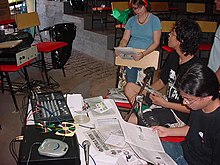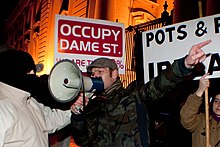Radical media are communication outlets that disperse action-oriented political agendas utilizing existing communication infrastructures and its supportive users. These types of media are differentiated from conventional mass communications through its progressive content, reformist culture, and democratic process of production and distribution.[1] Advocates support its alternative and oppositional view of mass media, arguing that conventional outlets are politically biased through their production and distribution.[2] However, there are some critics that exist in terms of validating the authenticity of the content, its political ideology, long-term perishability, and the social actions led by the media.[3]
The term "radical media" was introduced by John D. H. Downing in his 1984 study of rebellious communication and social movements emphasizing alternative media's political and goal-oriented activism.[3] Radical media manifests new social movements' individualistic, and humanistic socio-political model of disintermediation.[2] While the coverage of this term coincides with other branches of alternative media, namely tactical and activist media, it differs from conventional mass media in terms of its ideological and behavioural practices, making radical media significant in terms of its amplification of social movements. Downing describes Radical Media as being "generally small-scale and in many different forms, that express an alternative vision to hegemonic policies, and perspectives."[1][4] Hence, the term categorizes various forms of alternative media that are progressive, reformist and post-materialistic. Some media that are categorized by radical media include, but are not restricted to, community media, student media, tactical media, subcultural media, social movement media, citizen media, and alternative journalism. Groups that fall under radical media emphasize egalitarian channels characterized by inclusive, action-driven, prefigurative, and marginal practices that challenge conventional media.[1]



- ^ a b c Downing, John D. H.; Gil, Genève; Stein, Laura (2001). Radical media : rebellious communication and social movements (New ed.). Thousand Oaks, Calif.: Sage Publications. ISBN 0803956991.
- ^ a b Lievrouw, Leah A. (2009). Alternative and activist new media (Repr. ed.). Cambridge, UK: Blackwell Publishers. ISBN 978-0745641843.
- ^ a b Atton, Chris (2002). Alternative media (Reprinted. ed.). London: SAGE. ISBN 0761967710.
- ^ Medak, Tom. "The Idea of Radical Media :: Peović Vuković & Pasquinelli". YouTube. Retrieved 12 February 2014.

